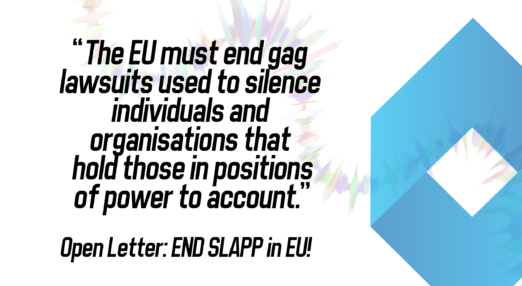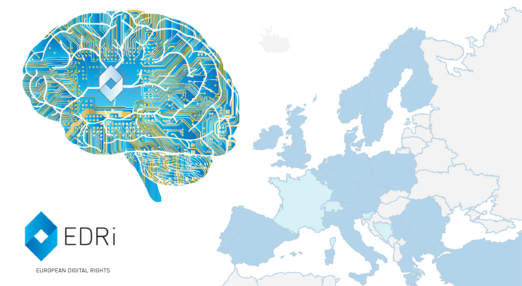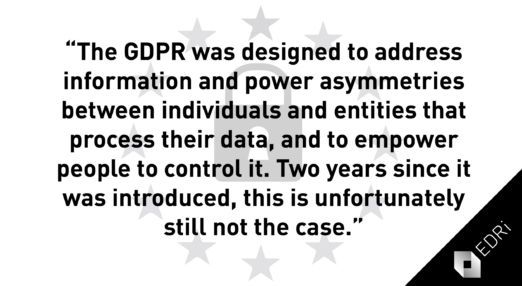fundamental rights
Filter by...
-

New poll exposes public fears over the use of AI by governments in national security
EDRi’s affiliate European Center for Not-for-Profit Law (ECNL) commissioned a survey in 12 EU countries, where a representative sample of the public was asked about their opinion on the use of AI by governments. The poll has exposed public fears and shown stark differences with some of the positions taken by EU countries. Check out the results.
Read more
-

Criminal complaint against illegal export of surveillance software is making an impact: the FinFisher group of companies ceases business operations after its accounts are seized by Public Prosecutor’s Office
Following a criminal complaint filed by the Society for Civil Rights (Gesellschaft für Freiheitsrechte e.V.), Reporters without Borders (RSF), the European Center for Constitutional and Human Rights (ECCHR) and netzpolitik.org over illegal exports of surveillance software, the Munich-based corporate group FinFisher has ceased its business operations. The Public Prosecutor’s Office Munich announced that it had seized the company’s accounts, after which FinFisher GmbH and two partner companies filed for insolvency.
Read more
-

Promoting human rights in the digital era
Digital technologies are part of everyday life, but we don’t know much about how they impact our rights. A Czech-Norwegian project aims to change this.
Read more
-

COVID-Tech: the sinister consequences of immunity passports
In EDRi’s series on COVID-19, COVIDTech, we explore the critical principles for protecting fundamental rights while curtailing the spread of the virus, as outlined in the EDRi network’s statement on the pandemic.
Read more
-

Open Letter: ending gag lawsuits in Europe – protecting democracy and fundamental rights
The European Digital Rights network joined 118 civil society organisations from across the globe in signing an open letter (the latest act of a longstanding movement) addressing the need to end gag lawsuits that threaten the public interest by allowing powerful actors to silence those that would speak against them.
Read more
-

Can the EU make AI “trustworthy”? No – but they can make it just
European Digital Rights (EDRi) submitted its answer to the European Commission’s consultation on the AI White Paper.
Read more
-

COVID-Tech: Surveillance is a pre-existing condition
In EDRi’s series on COVID-19, COVIDTech, we will explore the critical principles for protecting fundamental rights while curtailing the spread of the virus, as outlined in the EDRi network’s statement on the virus.
Read more
-

More than the sum of our parts: a strategy for the EDRi Network
It took over a year. From an EDRi members’ survey in early 2019 to the vote by the (online) General Assembly of members at the end of April 2020. In those months we held workshops, webinars, calls, several rounds of comments, draft iterations and about 50 consultations.
Read more
-

German Constitutional Court stops mass surveillance abroad
The German Federal Intelligence Service (BND) has so far been able to spy on foreign citizens abroad en masse and without cause—even on sensitive groups such as journalists.
Read more
-

Hungary: “Opinion police” regulate Facebook commentaries
There have been a number of critical news reports from around the world stating that Hungary’s COVID-19 state-of-emergency legislation is “creating a chilling effect”. Such headlines miss the mark somewhat, as chilling effects are far from new.
Read more
-

Open Letter: EDRi urges enforcement and actions for the 2 year anniversary of the GDPR
On 25 May 2020, for the General Data Protection Regulation (GDPR) 2 year anniversary, EDRi sent a letter to Executive Vice-President Jourová and Commissioner Reynders to highlight and urge action to the tackle the GDPR’s vast enforcement gap.
Read more
-

Austria’s biggest privacy scandal: residential addresses made public
Nobody took data protection into account for the so-called “Supplementary Register for Other Concerned Parties” (Ergänzungsregister für sonstige Betroffene). The Ministry for the Economy and the Finance Ministry are responsible for a data breach to which the Austrian Economic Chambers were an accomplice.
Read more
